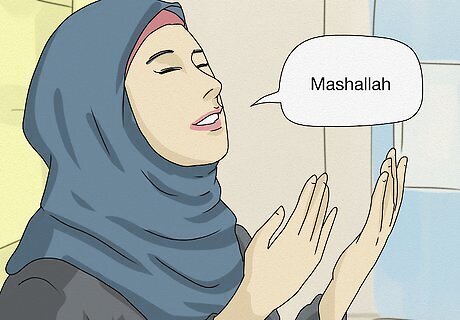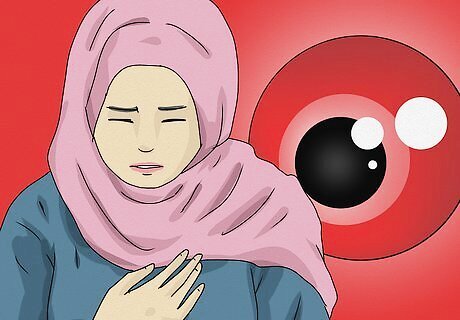
views
- “Mashallah” is an Arabic phrase that means “God has willed it.”
- Use “Mashallah” to show appreciation for something that has happened or congratulate someone for their accomplishments.
- In some cultures, people might say “Mashallah” to protect themselves from jealousy, the evil eye, or jinns.
Mashallah Meaning

Mashallah is an exclamation that means “God has willed it” in Arabic. Mashallah (also spelled Ma Sha Allah, Masha Allah, or Masha’Allah) is used to express a feeling of appreciation, awe, or thankfulness about a certain situation. It’s also used to congratulate someone for their accomplishments or achievements. “Ma” can be translated as “what,” “Sha” means “to will,” and “Allah” means “God.” Mashallah is also sometimes translated to “it is what God willed” or “what God has willed.” No one is sure when or where “Mashallah” was coined. The phrase only appears in a couple of Hadith and in one verse of the Qur’an, in surah Al-Kahf (18:39).
When to Use Mashallah

Say “Mashallah” to show gratitude when something great happens. Mashalla is most often said to express admiration, appreciation, or thankfulness when something incredibly great or prosperous happens. You might also say it if you hear or see something unbelievable. “My package has arrived safely, Masha Allah!” “Mashallah, what a beautiful and healthy baby.” “Ma Sha Allah! I got an A+ on my final exam!” “All my children are going to college this year, Mashallah!” “It’s a beautiful day for a picnic, Masha’Allah!”

Use “Mashallah” to acknowledge someone’s success or achievements. People often say “Mashallah” to congratulate someone else on their good fortune. “Mashallah” is also a reminder to the person that all fortune comes from Allah, and that they should remember to express gratitude and contentment for the success God has allowed them. “Mashallah, Sarah! I’m so proud of you for passing Spanish.” “Mashallah! Your new car is so fancy!” “Congratulations on your new job—Mashallah.” “You have a beautiful baby boy, Masha’Allah.” “Ma Sha Allah! Your new house is incredible—it’s so big!”

Say “Mashallah” to protect against jealousy, the evil eye, or jinns. In Islam, Allah alone can protect against the evil eye, a curse that’s manifested by casting an envious or ill-wishing glare, and jinns, or supernatural beings. Say “Mashallah” on your own possessions and successes or when you admire something to protect against these evil forces. Some believe that it may be stronger to say “Allahumma barik” or “May Allah bless you” to ward off the evil eye when you see something you admire. “You look so handsome tonight, Mashallah!” “Masha’Allah, I’ve just invented a new coding language.” “I got so many presents for my birthday party, Mashallah!” “Mashallah, she is so beautiful.” “Ma Sha Allah! I’m getting married next week!”
Responding to Mashallah

There’s no right way to respond when someone says “Mashallah.” There’s no right or wrong thing to say when someone says “Mashallah.” If someone says it to congratulate you, you can reply with something simple like “thank you,” or use the common Arabic response, “jazakallah khair(an),” which means “may Allah reward you.” “Mashallah, Muhammed! Congratulations for graduating from university!”“Thank you!” “Masha’Allah, your new baby is so beautiful!”“Jazakallah khair, Uncle!”
Who uses Mashallah?

Some non-Arabic cultures use Mashallah in everyday conversation. “Mashallah” is an Arabic word that’s most often used by Muslim speakers. However, it’s also used by some Christian and Jewish speakers to show praise and appreciation and to protect against the evil eye. Some cultures that exist in areas that were once ruled by the Ottoman Empire might use “Masala” (a form of “Mashallah”) to say “good job” or “job well done.”
Mashallah vs. Inshallah

Say “Mashallah” to refer to past events and "Inshallah" for future events. While “Mashallah” roughly translates to “God has willed it,” “Inshallah” means “If God wills” or “God willing.” Use “Inshallah” to express hope that a future event will come about or to express doubt that a certain event will happen (like “we’ll see” or “I doubt it” in English). Inshallah: “Inshallah, I hope we’ll get that house we applied for.” Mashallah: “Mashallah! Our realtor called, we got the house!” Inshallah: “Mom, I’m going to clean my room.”“When? Inshallah?” Mashallah: “I cleaned my entire room!”“Ma Sha Allah! You finally did it!”


















Comments
0 comment